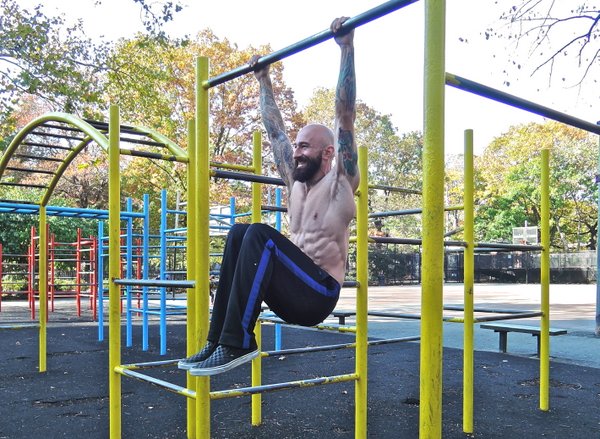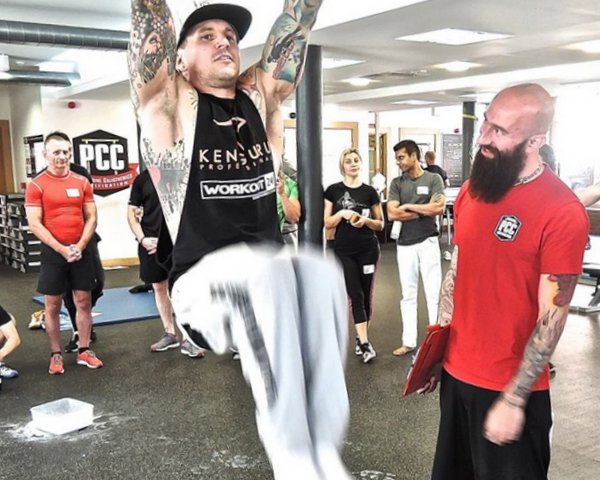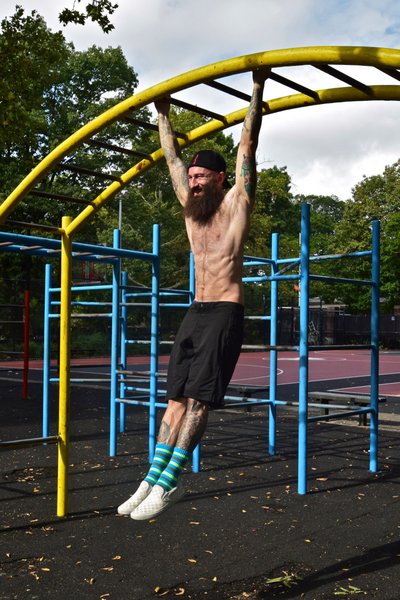 I get a lot of questions from potential PCC candidates about our Century Test. It’s understandable that folks want to be prepared for the testing that comes at the end of the PCC weekend, and it’s often the same questions that come up:
I get a lot of questions from potential PCC candidates about our Century Test. It’s understandable that folks want to be prepared for the testing that comes at the end of the PCC weekend, and it’s often the same questions that come up:
Am I allowed to come off the bar during the pull-ups?
Am I allowed to rest in a “down dog” position during the push-ups?
Can I bribe the instructors in order to pass?
Do I really have to go all the way down on all 40 squats?!?
Hardly anyone asks about the hanging knee raises. And this is precisely the problem. (For the record, the answers to the other 4 questions are NO, NO, NO and YES.)
Though far more people have failed the Century during the pull-ups than during the hanging knee raises, I believe that many of those who couldn’t complete their pull-ups had trouble at least in part due to the knee raises having taken more effort than they anticipated. If you’re struggling by your tenth hanging knee raise, it does not bode well for the rest of the test, even if you manage to hang on long enough to finish the 20 required reps. This is why perfecting your hanging knee raise is a key part of training for the Century. It’s a great strategy to make sure you have gas left in the tank to complete the test, and the extra time spent hanging from the bar can only help your pull-up game in the long run.
 The first few times I taught the PCC workshop I was surprised by how many people could not perform a proper hanging knee raise upon entering. At this point, it no longer surprises me, but it still sometimes amazes me when otherwise solid candidates struggle with this exercise. It’s not the hardest move in the world, but it does take some practice. Particularly in the context of the Century, performing 20 clean reps in a row is a more difficult task than many expect it to be, yet it seems like lots of folks show up for the PCC having never even attempted more than a single rep. People either underestimate the hanging knee raise, or they’re too focused on all the pull-ups to even notice this relatively modest exercise.
The first few times I taught the PCC workshop I was surprised by how many people could not perform a proper hanging knee raise upon entering. At this point, it no longer surprises me, but it still sometimes amazes me when otherwise solid candidates struggle with this exercise. It’s not the hardest move in the world, but it does take some practice. Particularly in the context of the Century, performing 20 clean reps in a row is a more difficult task than many expect it to be, yet it seems like lots of folks show up for the PCC having never even attempted more than a single rep. People either underestimate the hanging knee raise, or they’re too focused on all the pull-ups to even notice this relatively modest exercise.
As such, many PCC candidates end up getting “no-repped” on a lot of their hanging knee raises due to poor technique, which wastes both time and energy. If you wind up getting no-repped 6 or 7 times during the hanging knee raises, not only does that leave less time to rest before your pull-ups, it can also zap your strength and vitality.
If you want all of your reps to count, the biggest thing to watch out for is excessive swinging. This is especially true during the lowering phase of the movement. Though a slight degree of wavering may be unavoidable, anything more than that is unacceptable.
In order to facilitate a controlled descent, think about pointing your toes and reaching your feet slightly forward in the bottom position, almost like a gymnastic “hollow body” hold. This will help you avoid picking up excessive momentum. Also make sure to maintain tension in your abs, and don’t let your legs swing behind your body at the bottom of the rep.
 Focus on raising your knees with control as well. Avoid moving too quickly and aim to pause briefly at the top of each repetition to make sure that you remain steady.
Focus on raising your knees with control as well. Avoid moving too quickly and aim to pause briefly at the top of each repetition to make sure that you remain steady.
Furthermore, it’s crucial to make sure you have a solid grip. Squeeze the bar tightly, keep your elbows locked, and actively pull your shoulder blades down and back to minimize any swinging.
Though range of motion is less often a concern on this exercise than the others that comprise the Century test, it is essential that your knees are raised above hip height for a rep to count. Focus on tilting your hips and pelvis forward at the top of each rep in order to fully engage your abs and ensure that your knees come up high enough.
It’s great to understand all of those concepts theoretically, but it’s another thing to actually put in the time to get a feel for the exercise physically. The key to perfecting your hanging knee raise is very simple: lots of practice. Do them before your pull-ups to warm up or do them afterwards to burn out. Just make sure you do them before you come to PCC.
***
Al Kavadlo is the lead instructor for Dragon Door’s Progressive Calisthenics Certification. Recognized worldwide for his amazing bodyweight feats of strength as well as his unique coaching style, Al is the author of five books, including Raising The Bar: The Definitive Guide to Pull-up Bar Calisthenics and Pushing The Limits! Total Body Strength With No Equipment. Read more about Al on his website:www.AlKavadlo.com.